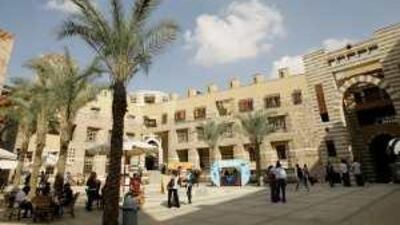CAIRO // A series of newspaper articles published in the past week by one of Cairo's most popular daily newspapers has given rise to suspicions that the American University in Cairo (AUC), one of Egypt's most prestigious universities, is acting as a proxy for the US department of defence. In the first of several articles printed last Monday, Al Masry Al Yawm newspaper cited a contract of 3.4 million Egyptian pounds (Dh2.2m) in the 2007 budget for AUC to provide "information about Egypt" to the Pentagon. The article went on to state that the contract, which was listed in the published White House budget from 2007, allows AUC to conduct research for the US navy on "infectious diseases, applied research and development in Egypt".
Despite the contract's seemingly innocuous goals, the article was enough to elicit official consternation from members of parliament. When the story was published on March 30, two independent lawmakers in the People's Assembly demanded an emergency meeting of national security and education officials to discuss the AUC's "espionage". The parliamentarians mentioned the university's stated openness to Israeli academics as a cause for concern.
By publishing these articles on its front page and insinuating that the contract was a recently revealed secret, Al Masry Al Yawm played on popular conspiracy theories - a fixture of Egypt's collective political consciousness - of US interloping in Egyptian affairs, say media experts and US embassy officials. And as Egypt's relatively young independent newspapers, such as Al Masry Al Yawm, grow in popularity and respectability, they risk lending credence to the sensational conspiracy theories that already saturate popular political discourse, say media observers.
"This is an oral culture, where all kinds of conspiracies just travel very fast without anyone knowing their source," said Hussein Amin, a professor in AUC's department of journalism. "But if we know the source, and it is already ignorant, and [people] say there are certain links and motives behind this article that could be truthful, you see that they have a bigger impact." As far as the management of Al Masry Al Yawm is concerned, their newspaper has achieved a victory for government transparency."Why is there a connection between civilian institutions and a foreign military institution?" said Mohamed Samir, the newspaper's managing editor. "We can't say this is wrong, but we can say it happened. Why should it be a secret?"
In fact, said a statement from the US Embassy in Cairo, the deals between the Pentagon and AUC have been entirely above board. "The contracts between the US Naval Medical Research Unit in Egypt (NAMRU-3) and The American University in Cairo have been a matter of public record since 2006," the statement read. The research "is completely academic in nature" and focuses primarily on avian influenza (bird flu), a disease that has affected 63 Egyptians since the epidemic began several years ago, according to the Egyptian health ministry.
"Any allegations that imply a secret or improper relationship are false," the statement said. The information is accessible through USA spending.gov, free of charge. In a show of transparency, the US Embassy last week invited reporters from Al Masry Al Yawm and Dream TV, an Egyptian satellite channel, to visit the Namru-3 facilities in Cairo. The embassy posted a clip on its website from the popular Dream chat show 10pm that showed an Egyptian reporter touring the facility dressed in a boxy biological suit and interviewing US officials.
Thanks to Al Masry Al Yawm breaking the story to Egypt's much-watched talk shows, the truth is out, Mr Samir said. But the damage to AUC's reputation - indeed, to Egypt's academic community - has already been done, Prof Amin said. "They don't know it, but they are also spreading ignorance by really putting a cap on research and by damaging the reputation of those who are working at AUC, whether students or faculty," he said. "If [the editor of Al Masry Al Yawm] wants the American University to stop publishing or doing joint research, that means he is asking the entire Egyptian academic society to stop publishing research. That contradicts scientific inquiry."
But if academics from AUC, which dates to 1919, and US Embassy officials had thought the episode had ended, they were surprised on Monday to see yet another AUC-related headline quoting information from America in Arabic, a US-based news service, and the same source used for the original article last Monday. This time, the article cited another budget item that had "unveiled" a contract with the US army to provide "advisory and administrative services" to AUC "in exchange for money".
Mr Samir plans to run the university's response to last Monday's article in today's newspaper. In downtown Cairo, news consumers reacted to this Monday's headline, which ran on page one above the paper's flag, with interest. "The American intelligence authority and the Israeli Mossad are the same thing. Israel is the child of America," said Morsil Assiuty, who described himself as a writer and expert on "Jewish thought" as he casually browsed the day's news. Mr Assiuty said he has no doubt that AUC had ulterior motives and that the United States intends to "dismantle the Arab world".
"Bush said he is the minister of war and that his task is to bring Islam to an end. Because he is ignorant, these Jewish intellectuals took advantage of him." At another news stand, Ibrahim Khalil was also buying a copy of Al Masry Al Yawm, which the stand's owner said is his best-seller. "It sounds like a good project. It includes education and will improve the status of the people," he said. "Why should it be threatening? Does AUC have any weapons?"
mbradley@thenational.ae

